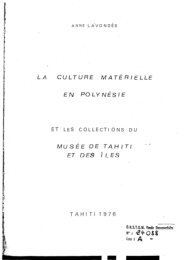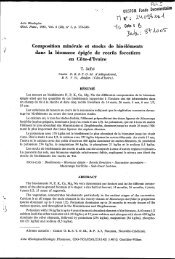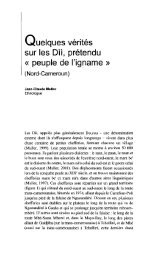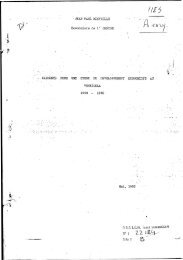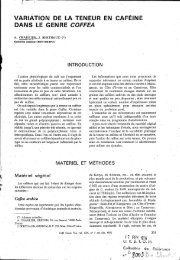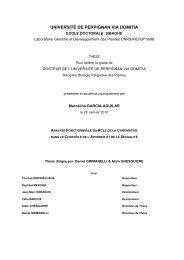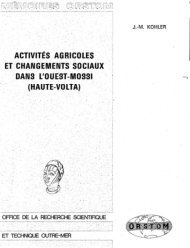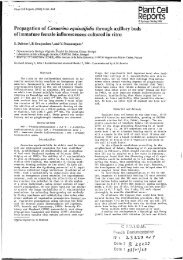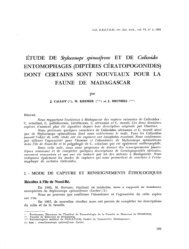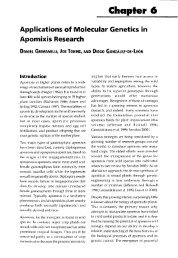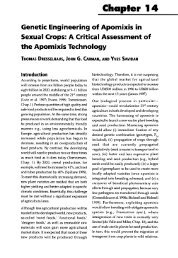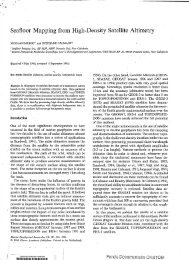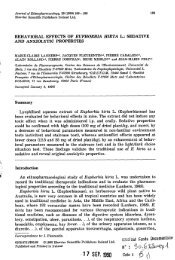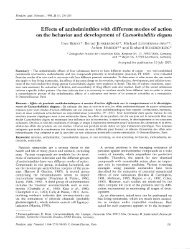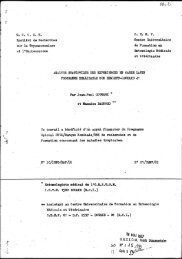A study case on coffee (Coffea arabica): Limu Coffe - IRD
A study case on coffee (Coffea arabica): Limu Coffe - IRD
A study case on coffee (Coffea arabica): Limu Coffe - IRD
Create successful ePaper yourself
Turn your PDF publications into a flip-book with our unique Google optimized e-Paper software.
C<strong>on</strong>sequently evicti<strong>on</strong> was rare and no populati<strong>on</strong> displacement accompanied this<br />
c<strong>on</strong>fiscati<strong>on</strong>. The effect <strong>on</strong> southern peasants was the realm of tribute. C<strong>on</strong>sequently the issue<br />
of possessi<strong>on</strong> remained hazy for several decades. The system imposed in the south<br />
represented an advance over the form of feudalism practiced in the north since the ruling class<br />
enlarged the privileges of gult, progressively eliminating the safeguards associated with rist.<br />
Generally, the landowners c<strong>on</strong>gregated in newly established towns that served as garris<strong>on</strong>s<br />
and administrative centres (as <strong>Limu</strong> Genet), and had little social intercourse with their tenants<br />
whom they regarded as their subjects.<br />
At the end of 19 th century, during the Abba Jiffar II reign, lands bel<strong>on</strong>g to big<br />
landowners (called Abba Lafa in Jima kingdom, which means land master). Those received<br />
their estates from the defeated king who remained the absolute owner. An estate represented<br />
fifteen to twenty hectares, up to forty hectares (<strong>on</strong>e gasha). Land masters employed tenants<br />
(chisanna, which points out the <strong>on</strong>e landless). They were given a little plot, half a fetchassa,<br />
they cultivated keeping all producti<strong>on</strong>. They had to work <strong>on</strong>e day per week (the chore) in land<br />
master estate (<strong>coffee</strong> harvest, transport), and to cultivate a two fetchassa plot for him of which<br />
they kept <strong>on</strong>e third to half producti<strong>on</strong>. Tenancy in the north was a minor phenomen<strong>on</strong>, the<br />
burden of oppressed minorities, especially Muslims 34<br />
. Moreover, land masters could be<br />
absentee land masters; in this <str<strong>on</strong>g>case</str<strong>on</strong>g>, they pointed out a tenant or family member as kapo and<br />
gave him a salary or a supplementary plot of which he kept all producti<strong>on</strong>. Abba Lafa also<br />
own slaves. Therefore, a little land proporti<strong>on</strong> was exploited by peasants, from <strong>on</strong>e to three<br />
hectares plots. Those could be land masters’ descendants whose estate got divided. They used<br />
to keep their whole producti<strong>on</strong>, and often owned slaves.<br />
Jima kingdom was the excepti<strong>on</strong> of the five Gibe sultanates, because the local<br />
leadership allied itself with the invaders and avoided expropriati<strong>on</strong> in return for an annual<br />
tribute.<br />
34 Historically, trade has also been the occupati<strong>on</strong> of minorities in Ethiopia. It became particularly associated<br />
with Muslim communities who were barred from landholding.<br />
51



